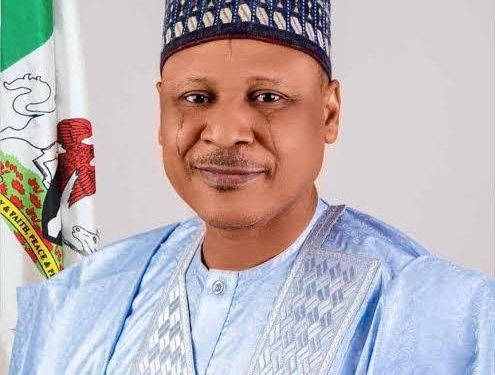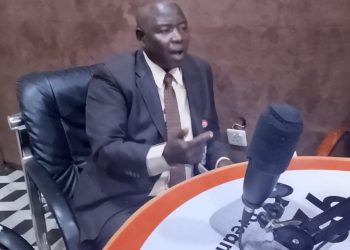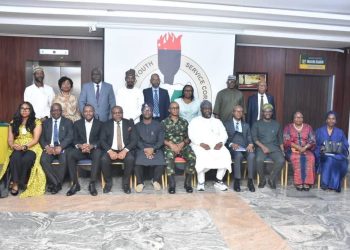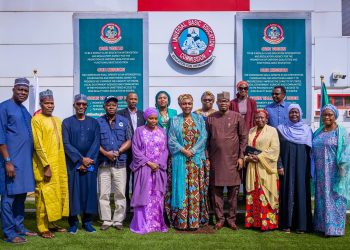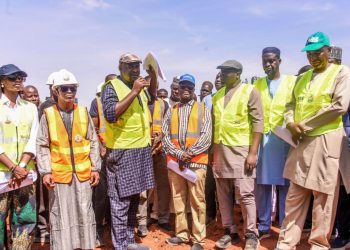By Nkechi Eze
The Hon. Minister of Information and National Orientation, Mohammed Idris, has declared that the country is on an irreversible path to growth and renewal as it celebrates 65 years of independence, urging citizens at home and abroad to rally around President Bola Ahmed Tinubu’s Renewed Hope Agenda in order to consolidate the gains of ongoing reforms.
Speaking at a press conference held on Monday, September 29, 2025, at the National Press Centre, Radio House, Abuja, Idris said the 65th anniversary is not just a ceremonial milestone but a time for sober reflection, stock-taking, and renewed commitment to nation-building. He likened the age of 65 to the sapphire gemstone, which symbolizes loyalty, trust, truth, nobility, sincerity, beauty, and wisdom, qualities he described as “defining of the Nigerian soul and spirit.”
The minister praised President Tinubu’s courage in dismantling “stubborn cogs in the wheel of progress” and driving reforms under the Renewed Hope Agenda and its eight priority areas, which he said are laying the foundation for prosperity, peace, and unity. “Our trade surplus continues to grow, inflation is declining, the naira is strengthening, food prices are falling, and our external reserves are rising. These are eloquent testimonies that Nigeria is on the right track,” Idris affirmed.
He announced that by January 2026, the administration will commence the implementation of the Tax Acts quartet to broaden the revenue base, simplify tax collection, and ease the burden on Nigerians. He noted that the additional revenue is already being channeled into critical investments in health, education, infrastructure, agriculture, energy, regional development, small businesses, youth empowerment, and national security.
On education, the minister revealed that more than 500,000 students across universities, polytechnics, and colleges of education are already benefiting from the National Education Loan Fund (NELFUND), which he described as “unprecedented in the nation’s history.” He further pointed to the establishment of five new regional development commissions and a supervising ministry as evidence of the administration’s grassroots and people-centered approach.
Highlighting what he termed a “transportation revolution,” Idris cited the construction of four flagship presidential legacy highways: the 1,068-kilometre Sokoto–Badagry Superhighway, the 750-kilometre Lagos–Calabar Coastal Highway, the 477-kilometre Trans-Saharan Highway, and the 422-kilometre Akwanga–Jos–Bauchi–Gombe Expressway. These, he said, will be complemented by the Kano–Kaduna standard gauge rail and the rehabilitation of the Port Harcourt–Maiduguri Eastern Corridor rail line.
In the power sector, Idris announced progress on the 255MW Kaduna Power Plant, the Siemens Presidential Power Initiative, and the Presidential Metering Initiative that aims to deliver 7 million smart meters by 2027. He also disclosed that Nigeria is implementing one of the world’s largest renewable energy projects, the $750 million World Bank-backed DARES programme, which will provide clean, off-grid electricity to 17.5 million Nigerians.
On oil and gas, he said output has risen to meet OPEC quotas, while losses and gas flaring are at record lows. Investments worth over $5 billion are flowing into deepwater exploration, while three new oil wells are being drilled in the Kolmani region of Bauchi and Gombe States. He also pointed to major investments in lithium processing, with a $50 million plant in the FCT and a $600 million facility in Nasarawa State.
Health infrastructure is also receiving a boost, with the rehabilitation of over 1,000 primary health centres and the commissioning of three world-class cancer centres in Benin, Katsina, and Enugu, with three more nearing completion in Jos, Lagos, and Zaria.
The minister dismissed suggestions of lopsided development, stressing that capital projects are equitably distributed across regions. He also pointed to increased federal allocations to states following the removal of fuel subsidies, alongside secured funding for light rail projects in Kano and Kaduna. He announced the establishment of the Ministry of Livestock Development and the recapitalisation of the Bank of Agriculture to the tune of ₦1.5 billion to drive agricultural transformation.
Beyond domestic reforms, Idris recalled Nigeria’s historic leadership role in Africa’s independence struggles, regional peacekeeping efforts through ECOWAS and ECOMOG, and its continuing contributions to the United Nations. He emphasized Nigeria’s strategic partnership with the African Union, including the recent agreement to provide Strategic Sea Lift Services for peacekeeping and humanitarian missions.
As Nigeria celebrates 65 years of independence, Idris urged Nigerians to unite in patriotism and embrace the government’s call for collective responsibility. “The Renewed Hope Agenda is not just a slogan, it is a reality already touching lives,” he said. “We acknowledge the sacrifices made in the past 28 months as President Tinubu steadied the ship. Now it is time for Nigerians to reap the fruit of reforms painstakingly planted.”
He assured citizens that the administration is listening, working for all Nigerians, and committed to ensuring that no one is left behind. “Together,” he declared, “we can make our country greater than ever before. Happy Independence Day, and may God bless the Federal Republic of Nigeria.”


